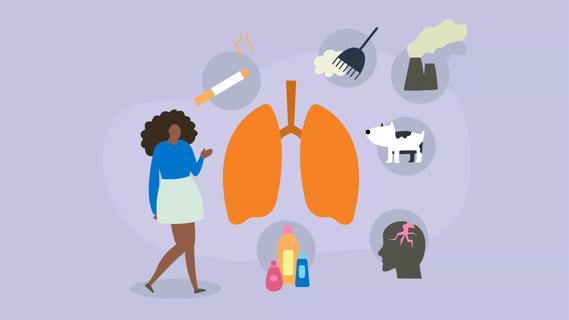Adult-onset asthma has the same symptoms as childhood asthma, but tends to be more severe

It’s common for childhood asthma symptoms to ease with age. But is the reverse also true? Can you develop asthma as you get older?
Advertisement
Cleveland Clinic is a non-profit academic medical center. Advertising on our site helps support our mission. We do not endorse non-Cleveland Clinic products or services. Policy
The short answer is: Yes.
For more details, we spoke with pulmonologist Rachel Taliercio, DO. Dr. Taliercio answers common questions about adult-onset asthma.
Adult-onset asthma refers to asthma that you acquire after the age of 20, as opposed to being diagnosed as a child.
“The symptoms of adult-onset and childhood asthma are the same, but they tend to be more severe in adults,” Dr. Taliercio explains. “For example, childhood asthma symptoms are more likely to be milder and well-controlled and may improve or disappear with time. Asthma can be more severe, harder to treat and persist if you develop the condition when you’re older.”
It’s more common to experience asthma symptoms as a child, but adult-onset asthma is usually worse.
One possible reason? Adults are more likely to ignore their symptoms. Life is busy. And it’s easy to assume shortness of breath is a sign that you’re “out of shape,” or that a chronic, dry cough is a normal part of getting older. (It’s not!)
Getting diagnosed with adult-onset asthma — and finding the right therapy — can be a longer process, for reasons we’ll explain in a bit.
“Unfortunately, delays in the diagnosis and treatment of asthma can weaken your lung function,” clarifies Dr. Taliercio. “It’s important to seek medical attention right away if your symptoms suggest you may have developed asthma.”
Advertisement
Adult-onset asthma symptoms also tend to be harder to control. For these reasons, adults with asthma have a higher risk of flare-ups and even hospitalization. In fact, the death rate for adult-onset asthma is far higher than the death rate for childhood asthma.
The statistics are unnerving, but there are things you can do to reduce your risk of complications. (More on them in a bit, too.)
Factors that increase your risk of developing adult-onset asthma include:
Diagnosing and treating childhood asthma tends to be more straightforward than it is in adults.
Why is diagnosing adult-onset asthma more complex? We’ve mentioned the tendency to ignore symptoms until they’re really bad — but that’s not the only issue.
Even if you alert a healthcare provider as soon as you notice something’s off, the list of possible causes is much longer when you’re older. It also includes serious conditions that tend to emerge later in life, like:
It’s important to rule out these possibilities, especially because some of these conditions are more common in people with asthma.
Diagnosing asthma will involve a breathing test. If you’ve been prescribed any maintenance inhalers, it’s important to hold off using these the day before and on the day of testing.
Once you and your provider know you have asthma, you’ll face another challenge: Finding the best way to manage your symptoms. Again, treating asthma is harder in adults than it is in children because:
Advertisement
Inhaled and oral asthma medications, which open your airways and soothe inflammation, are often used to treat acute symptoms and prevent flare-ups. You may also need to take maintenance medications you take routinely, like biologics or inhaled corticosteroids.
If you’re living with asthma, it’s important to follow your provider’s instructions as closely as possible and know your asthma triggers — that way, you can adjust your lifestyle to more easily avoid them. Here are a few examples from Dr. Taliercio:
Advertisement
Like many chronic illnesses, adult-onset asthma can disrupt your life and hurt your mental health. But the reverse is also true: Taking care of your mental health may lessen your symptoms — and might even reduce the number of asthma attacks you have. Consider creating a mindfulness routine, practicing self-care, joining a support group and more.
“Breathlessness is stressful, but being stressed can make breathing even harder,” recognizes Dr. Taliercio. “Learning positive coping mechanisms can help you avoid that vicious cycle.”
If you suspect you might have asthma, see a provider as soon as possible.
“Undiagnosed asthma can cause loss of lung function that may be permanent,” Dr. Taliercio stresses. “Don’t ignore your symptoms.”
You’ll breathe a lot easier once you address the problem.
Advertisement
Learn more about our editorial process.
Advertisement

Wearing a scarf, adjusting your outdoor activities and following your asthma treatment plan can help limit breathing problems

An asthma action plan is a personalized, step-by-step set of instructions for handling asthma attacks

Checking the weather, pollen counts and air quality can help you avoid asthma triggers

Stress can trigger and worsen asthma symptoms, like coughing and shortness of breath

Smoking, including secondhand smoke, can worsen your asthma triggers and damage your airways

Nighttime asthma attacks can be due to acid reflux, allergens and hormonal changes, but treatment can help prevent them

The effectiveness and safety of many of these options are unknown, so it’s best to stick to traditional care

Avoid triggers like dust, smoke and cold air to lessen your chances of coughing

Wearing a scarf, adjusting your outdoor activities and following your asthma treatment plan can help limit breathing problems

Your diet in the weeks, days and hours ahead of your race can power you to the finish line

When someone guilt trips you, they’re using emotionally manipulative behavior to try to get you to act a certain way